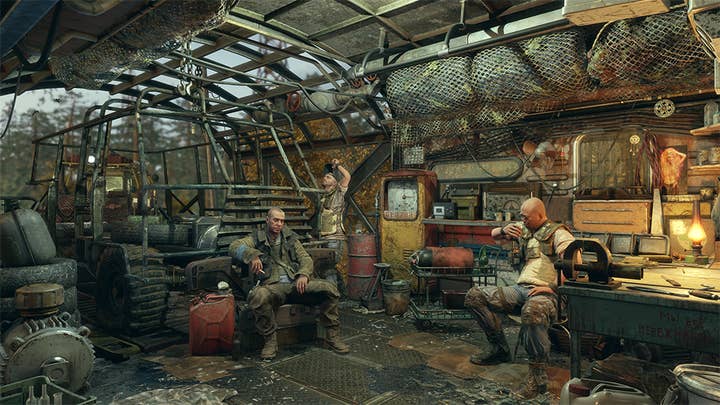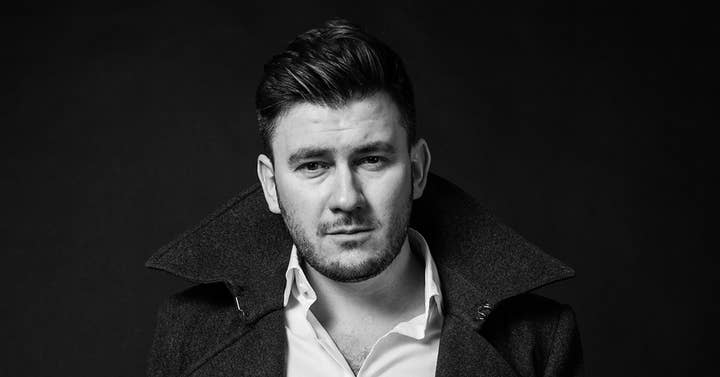From pages to polygons: The storytelling of Metro Exodus
Metro 2033 author Dmitry Glukhovsky on working with 4A Games and why he wants more games based on books
It's difficult for Dmitry Glukhovsky to say exactly how his book sales have been boosted by the release of the Metro video games.
While he acknowledges they have "definitely helped", the "viral magic" of the first novel -- Metro 2033 -- has seen it shared among friends throughout the author's home market of Russia and beyond. By the time the game adaptation of Metro 2033 landed on shelves, its source material was already translated into at least a dozen languages and was a best-seller in Russia, Germany, Poland and several other countries.
But the games have contributed to taking Metro international, with Glukhovsky telling us "the existence of pirated games" have seen the books brought to Iran, Thailand, Korea and other far-flung nations.

Interestingly, the original Metro 2033 game dates back to before the novel was ever published. In 2002, Glukhovsky set up a website dedicated to this story he planned to tell, occasionally publishing new chapters for free. Ukranian developer 4A Games had read this when they approached the author.
"When they wanted to create a game based on it, I was really excited because I already, by the rights of my birth, belong to the generation that fucking loves video games," Glukhovsky tells GamesIndustry.biz.
"Turning that into a transmedia thing [has been] a very natural thing. Books were helping the games, the games were helping the books, and somehow Metro -- especially Metro -- is a story that's playable. People love to cosplay the factions, there are board games, some even live-action role-play it, and then first and foremost there are the big video games from 4A. This is something that is already a living creature that lives by its own rules that I don't always understand."
There's a fascinating back and forth relationship between the books and games. Metro: Last Light, the second game, remains separate from the sequel novel Metro 2034. But Last Light directly inspired the third book, Metro 2035, which in turn has formed the basis of this week's release, Metro Exodus. In fact, Glukhovsky says he integrated the latter two stories together from the beginning, writing them alongside each other to ensure they were in sync.
That's not to say the video games, and the wider audience they have brought to the series, have changed the way Glukhovsky writes -- far from it. Instead of simplifying the themes and tone of his works for a mainstream audience, he has doubled down on the grittiness that made 2033 a hit to begin with.
"Out of nothing, you're completely able to fantasise about worlds, non-existent people, their relationships, their suffering and their discoveries -- just because of a good story. It's fucking magic"
"It doesn't mean now I have to think it's going to be read by American teenagers so let's simplify things because they won't understand the complexity," he says. "I don't talk down to my readers, I don't treat them like idiots.
"The discoveries I've made in the last ten years, the change in tonality, the things i find thrilling in literature right now -- I will put everything into the new books. I will not condescend, I will not try to avoid controversial issues just because, 'hey, it's mass market now, let's not offend anybody'. No, let's offend everybody, let's provoke people, let's throw some shit at the fan, let's go rock and roll.
"I certainly wouldn't think 'this could become a video game so let's add more tunnels and streamline the plot'."
Instead, he has worked closely with 4A Games to ensure the video games match the tone of his books. While writing the plot for a video game is, in many ways, much simpler -- "You go there, this is your objective, you do this, do that, murder this person, save that one, and get to the next level" -- Glukhovsky wanted to ensure the context of the action is more meaningful. He didn't want players to be "accomplishing tasks that don't mean a lot."
He also wanted the virtual world of Metro to have the same depth and life as the literary one. In the games, having characters talking around you -- even if it's unrelated to the plot -- adds to the atmosphere, and Glukhovsky was keen that non-player characters are not simply treated like "instruments... that you have to unlock with dialogue."
"That's a very psychopathic [view]," he says. "You don't have any empathy, you treat people like objects that you only need to serve your purposes - that's a clear definition of psychopathy, and that's what you usually do in video games. There aren't many useless subjects around you, they're all 'useable' -- and I don't want them to be useable, I want them to be like real life."
There are some clear parallels between the Metro series and CD Projekt's The Witcher games. Both are based on obscure books -- at least, on a global scale -- but their adaptations into video games has significantly boosted the franchise across various media.
However, while Witcher author Andrzej Sapkowski has had a strained relationship with CD Projekt Red -- even taking legal action to demand more royalties -- Glukhovsky has enjoyed a much more amicable collaboration with 4A Games. While he admits there has sometimes been tension between them, he has "never doubted their talent and I've never doubted the positive effect their creation will have on my career and promotion for the books". Any differences have been over minor plot details, rather than of a financial nature.
"Working with talented people and giving them freedom is way better than working with idiots and controlling every step they make"
Crucially, the author has determinedly let 4A Games take the lead on its titles. While Metro is not the only thing he has written, it's still important to him -- but that does not mean he has been precious about how his intellectual property has been used.
"I'm not a control freak," he says. "I'm happy to participate, but I don't want to control them. First of all, I don't have time to control everybody, it doesn't give me much pleasure. I prefer to find talented partners and give them freedom. When they need a consultation, they can come to me and ask questions. But as long as it's generally in line with the feeling of [Metro], as long as they're faithful to the spirit, I'm totally fine with them having their own interpretation.
"Working with talented people and giving them freedom is way better than working with idiots and controlling every step they make to make sure they don't do any shit to the property. So yeah, basically my relationship with 4A Games is a love story. Every love story has its ups and downs, but we have three kids in common so it's a long-term love."
Glukhovsky is also open to more developers bringing their own talents to the Metro universe, having already opened it up to other creators. Even in the days of the original website, he allowed fans to create music and pictures inspired by Metro 2033, and in the years since he has taken this even further.
While Glukhovsky has only written the three core novels -- 2033, 2034 and 2035 -- there are over 100 books published in the world of Metro. These have been written by authors in Ukraine, Poland, England, Italy -- in fact, he's just signed a contract for a Cuban author to tell a story in his universe. Each title explores another aspect of Metro's post-apocalyptic setting, whether it's near Glukhovsky's characters in Moscow or in other countries entirely. The Cuban author plans to set his book in the catacombs of Havana, while the Italian told a story of roaming fortresses journeying from Rome to Venice, of giant quarry trucks converted into armoured churches.

Glukhovsky has already tried pitching such ideas to the games industry: "Before THQ went bankrupt, I was saying we should do the roaming fortress thing - that's so cool. Or there was a nuclear submarine story, let's do that. I don't insist on it just being in Moscow. My purpose was to expand it into the biggest international project possible. The wilder it gets, the cooler it is.
"I have the books and nobody is spoiling them, no one is destroying the books to build a new story. The books are there as source material, and they're open for experimentation. You have your own plot ideas, let's discuss them. I can sometimes disagree, but go ahead and convince me."
The Russian author is also keen for developers to explore other authors' story worlds as sources of inspiration for their games. Books, he says, have the "solidity of plot", complete with pre-established characters, stories and dramatic components. And, "like every good fairy tale", they have themes that relate to something real.
"The games industry is making this discovery now -- that you can't keep entertaining people by titillating their more primitive instincts," he says. "Just smashing people's heads in and rushing around in cars does not give you as much fun. Plus, as the gamers become older and they stop being teenagers, they start getting into their 20s, 30s and even 40s, even if they don't game as much, they need something else.
"Just a mere action plot is not enough to grasp your attention for a long time when you're 37. How long can you murder those Nazis? It gets boring after a while. Yet for some reason you can sit and watch five seasons of Breaking Bad back-to-back, even though it's like three sets and a cast of five people and it's set in the middle of the desert.
"That's the difference, and I believe games can and should start telling deeper and better stories because that's what will ultimately transform the industry. The story is what turns the stains of paint on paper into real people and their dramas. Out of nothing, you're completely able to fantasise about worlds, non-existent people, their relationships, their suffering and their discoveries -- just because of a good story. It's fucking magic."










